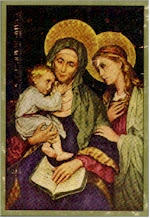1. Instrumental music with no singing
In some parishes, instrumental music is used at certain points during Mass. A passage will be played on an organ or on another instrument or instruments, even though nobody is singing.
But not in Lent (with a few exceptions).
The General Instruction of the Roman Missal (GIRM) states:
313. In Lent the playing of the organ and musical instruments is allowed only in order to support the singing. Exceptions, however, are Laetare Sunday (Fourth Sunday of Lent), Solemnities, and Feasts.
2. Singing or saying the Gloria
Just after Sunday Mass begins, it is common to sing or say the Gloria ("Glory to God in the highest").
But not on the Sundays of Lent.
The General Instruction states:
53. The Gloria in excelsis (Glory to God in the highest) . . . is sung or said on Sundays outside Advent and Lent, and also on Solemnities and Feasts, and at particular celebrations of a more solemn character.
3. Singing or saying the Alleleuia before the Gospel
During most of the year we sing or say the Alleluia before the reading of the Gospel.
But not in Lent.
The General Instruction states:
62. a) The Alleluia is sung in every time of year other than Lent. The verses are taken from the Lectionary or the Graduale.
b) During Lent, instead of the Alleluia, the verse before the Gospel as given in the Lectionary is sung. It is also possible to sing another Psalm or Tract, as found in the Graduale.
4. Flowers on the altar
It is common for the altar to be decorated with flowers during most of the year (that is, there will be flowers around the altar, though not on top of the altar table itself).
But not in Lent (with a few exceptions).
The General Instruction states:
305.
During Lent it is forbidden for the altar to be decorated with flowers. Exceptions, however, are Laetare Sunday (Fourth Sunday of Lent), Solemnities, and Feasts.
In the UK Laetare Sunday also coincides with the celebration of Mothering Sunday or Mother's Day which is a secular celebration. Whilst we do remember and honour all Mothers on this day, and rightly so; the changes to the liturgy such as the provision of flowers in the sanctuary and the rose-coloured vestments worn by the Priest and Deacon are in celebration of Laetare Sunday rather than Mother's Day.
5. Emptying holy water fonts
In recent years, some parishes have taken the holy water out of the holy water fonts during Lent. They have even filled them with sand in some cases.
The idea, they say, is to convey the thought that Lent is a time of spiritual dryness--a "desert" experience--that precedes Easter, in which we refrain from using the sacramental of holy water.
Despite its popularity in some places, this practice is not permitted.
It has been the Church's practice to empty the holy water fonts during Triduum, but for a different reason. It is not permitted to have them empty through the whole season of Lent.
The Congregation for Divine Worship has stated:
This Dicastery is able to respond that the removing of Holy Water from the fonts during the season of Lent is not permitted, in particular, for two reasons:
1. The liturgical legislation in force does not foresee this innovation, which in addition to being "praeter legem" [i.e., "apart from the law"] is contrary to a balanced understanding of the season of Lent, which though truly being a season of penance, is also a season rich in the symbolism of water and baptism, constantly evoked in liturgical texts.
2. The encouragement of the Church that the faithful avail themselves frequently of the sacraments is to be understood to apply also to the season of Lent. The "fast" and "abstinence" which the faithful embrace in this season does not extend to abstaining from the sacraments or sacramentals of the Church.
The practice of the Church has been to empty the Holy Water fonts on the days of the Sacred Triduum in preparation of the blessing of the water at the Easter Vigil, and it corresponds to those days on which the Eucharist is not celebrated (i.e., Good Friday and Holy Saturday) [3/14/03: Prot. N. 569/00/L].
6. Veiling crosses and statues before the Fifth Sunday of Lent
This practice is permitted beginning with the Fifth Sunday of Lent, but not before.
The Roman Missal states:
In the Dioceses of the United States, the practice of covering crosses and images throughout the church from this [Fifth] Sunday may be observed.
Crosses remain covered until the end of the Celebration of the Lord's Passion on Good Friday, but images remain covered until the beginning of the Easter Vigil.
Notice that the practice is option (the practice "may be observed" not "is to be observed").
If it is not observed, in a particular parish, from the Fifth Sunday of Lent, there is additional encouragement to do remove or veil crosses after the Mass of the Lord's Supper on Holy Thursday.
The rubrics in the Roman Missal for that day state:
At an appropriate time, the altar is stripped and, if possible, the crosses are removed from the church.
It is expedient that any crosses which remain in the church be veiled.
NB. These notes refer to Dioceses in the USA but they also apply to England and Wales.



